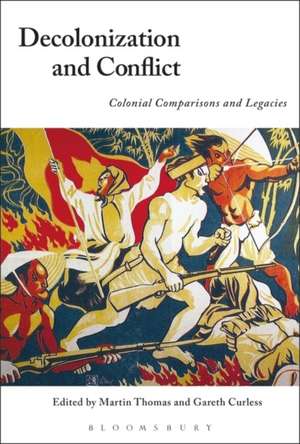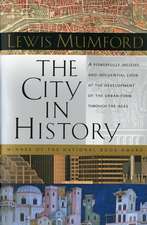Decolonization and Conflict: Colonial Comparisons and Legacies
Editat de Martin Thomas, Gareth Curlessen Limba Engleză Paperback – 26 dec 2018
| Toate formatele și edițiile | Preț | Express |
|---|---|---|
| Paperback (1) | 232.17 lei 6-8 săpt. | |
| Bloomsbury Publishing – 26 dec 2018 | 232.17 lei 6-8 săpt. | |
| Hardback (1) | 774.77 lei 6-8 săpt. | |
| Bloomsbury Publishing – 14 iun 2017 | 774.77 lei 6-8 săpt. |
Preț: 232.17 lei
Preț vechi: 297.79 lei
-22% Nou
Puncte Express: 348
Preț estimativ în valută:
44.43€ • 48.41$ • 37.44£
44.43€ • 48.41$ • 37.44£
Carte tipărită la comandă
Livrare economică 23 aprilie-07 mai
Preluare comenzi: 021 569.72.76
Specificații
ISBN-13: 9781474250375
ISBN-10: 1474250378
Pagini: 296
Dimensiuni: 156 x 234 x 14 mm
Greutate: 0.41 kg
Editura: Bloomsbury Publishing
Colecția Bloomsbury Academic
Locul publicării:London, United Kingdom
ISBN-10: 1474250378
Pagini: 296
Dimensiuni: 156 x 234 x 14 mm
Greutate: 0.41 kg
Editura: Bloomsbury Publishing
Colecția Bloomsbury Academic
Locul publicării:London, United Kingdom
Caracteristici
The coverage of transnational activism, armed insurrection, state violence and human rights abuses has clear resonances with contemporary issues
Notă biografică
Martin Thomas is Professor of Imperial History at the University of Exeter, UK, where he is Director of the Centre for the Study of War, State and Society. His recent publications include Violence and Colonial Order (2012), Fight or Flight: Britain, France, and their Roads from Empire (2014) and he is co-author of Crises of Empire: Decolonization and Europe's Imperial States, 1918-1975 (2015).Gareth Curless is an ESRC Future Research Leader (2013-16) and a Lecturer in the Department of History at the University of Exeter, UK. He is currently working on a monograph that investigates the relationship between labour unrest and decolonization in the British Empire.
Cuprins
Introduction: Decolonization, Conflict and Counter-Insurgency, Martin Thomas and Gareth Curless (both University of Exeter, UK) 1. Seeing Like a Soldier: The Amritsar Massacre and the Politics of Military History, Kim Wagner (Queen Mary University, London, UK)2. Confronting Revolt in France's Interwar Europe: Counterinsurgency in 1920s Morocco and Syria, Martin Thomas (University of Exeter, UK)3. The Plantation as Counter-Insurgency Tool: Indonesia 1900-50, Roel Frakking, (European University Institute, Italy)4. The Sten Gun is Mightier than the Pen: The Failure of Colonial Police Reform after 1945, Gareth Curless, (University of Exeter, UK)5. 'A Litigious Island': Law, Rights, and Counter-Insurgency during the Cyprus Emergency, Brian Drohan, (University of North Carolina, USA)6. 'A Battle in the Field of Human Relations': The Official Minds of Repressive Development in Portuguese Angola, Miguel Bandeira Jerónimo, (Universidade de Lisboa, Portugal)7. Strategic Villages: Forced Relocation, Counterinsurgency and Social Engineering in Kenya and Algeria, 1952-1962, Moritz Feichtinger, (University of Bern, Switzerland)8. Reconsidering Women's Roles in the Mau Mau Rebellion in Kenya, 1952-1960, Katherine Bruce-Lockhart,(University of Cambridge, UK) 9. The Art of Counter-insurgency: Phase Analysis with Primary Reference to Malaya (1948-60), and Secondary Reference to Kenya (1952-60), Karl Hack, (Open University, UK) 10. Rebel Sanctuaries and Late Colonial Conflicts: The Case of Federal Germany during Algeria's War of Independence, 1954-1962, Mathilde von Bülow, (University of Glasgow, UK)11. David Galula and Maurice Papon: A Watershed in COIN Strategy in de Gaulle's Paris, Emmanuel Blanchard, (Université de Versailles, France) and Neil MacMaster, (University of East Anglia, UK) 12. Escaping the Empire's Shadow: British Military Thinking about Insurgency on the eve of the Northern Ireland Troubles (Huw Bennett, Aberystwyth University, UK)13. Shadow Warriors: The Phoenix Program and American Clandestine Policing in Vietnam (Jeremy Kuzmarov, University of Tulsa, USA)Index
Recenzii
O?ers a valuable tour d'horizon of emerging scholarship ... [Includes] informative and thought-provoking case studies.
In this collection of essays, Thomas and Curless have brought together some of the best historians of 20th century imperialism to discuss the relationship between warfare and the end of empire. The result is a provocative and enlightening book which offers insights into some of the most important topics in the field including imperial policing, modernisation, gender and the colonial legacy. It marks a major advance in our understanding of the wars of European decolonisation.
This is a unique volume spanning an impressive range of insurgency situations. It marks a forceful intervention in recent debates regarding decolonization era conflicts, offering fascinating case studies and fresh historiographical and intellectual perspectives.
Martin Thomas and Gareth Curless have produced a uniformly outstanding anthology that will long remain the last word on comparative colonialism between 1920 and 1970. The book demolishes the claims of both imperial apologists, and rosy post-colonial historiography to point convincingly to the affects of colonial violence, hypocrisy, and militarized policing on both the post-colonial state, and the former colonial metropole. This book makes depressing, but illuminating reading for those wishing to understand, for example, why police departments in Europe and America storm immigrant and minority neighborhoods with body armor, automatic weapons, and armored vehicles in the new century.
In this collection of essays, Thomas and Curless have brought together some of the best historians of 20th century imperialism to discuss the relationship between warfare and the end of empire. The result is a provocative and enlightening book which offers insights into some of the most important topics in the field including imperial policing, modernisation, gender and the colonial legacy. It marks a major advance in our understanding of the wars of European decolonisation.
This is a unique volume spanning an impressive range of insurgency situations. It marks a forceful intervention in recent debates regarding decolonization era conflicts, offering fascinating case studies and fresh historiographical and intellectual perspectives.
Martin Thomas and Gareth Curless have produced a uniformly outstanding anthology that will long remain the last word on comparative colonialism between 1920 and 1970. The book demolishes the claims of both imperial apologists, and rosy post-colonial historiography to point convincingly to the affects of colonial violence, hypocrisy, and militarized policing on both the post-colonial state, and the former colonial metropole. This book makes depressing, but illuminating reading for those wishing to understand, for example, why police departments in Europe and America storm immigrant and minority neighborhoods with body armor, automatic weapons, and armored vehicles in the new century.











